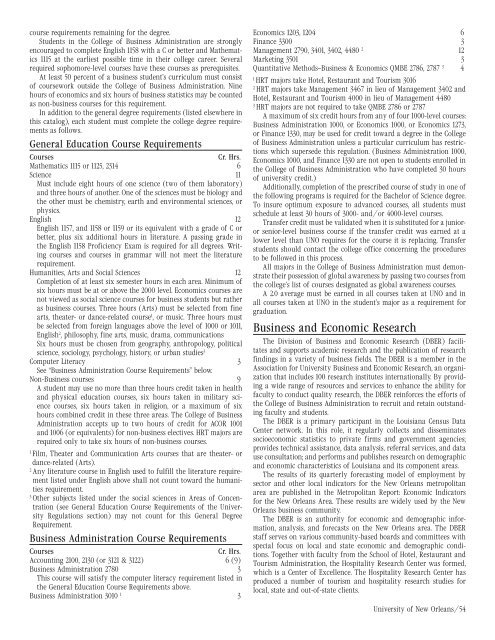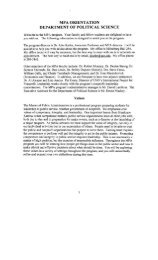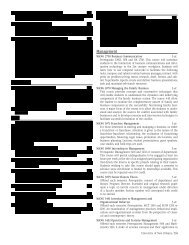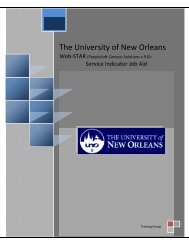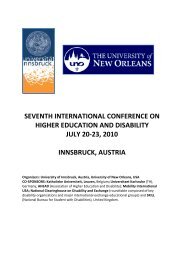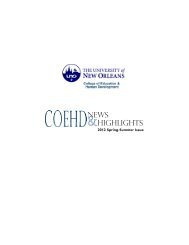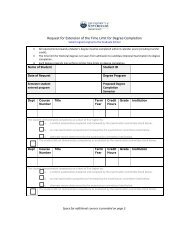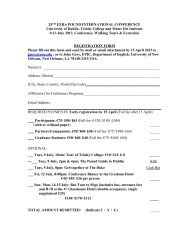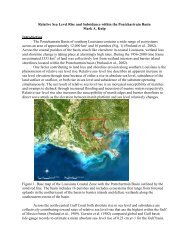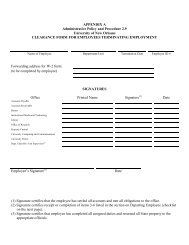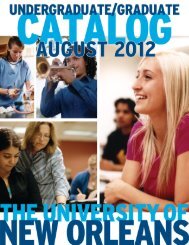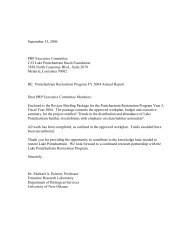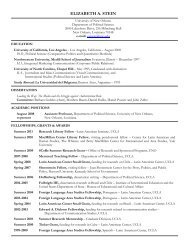Untitled - University of New Orleans
Untitled - University of New Orleans
Untitled - University of New Orleans
Create successful ePaper yourself
Turn your PDF publications into a flip-book with our unique Google optimized e-Paper software.
course requirements remaining for the degree.<br />
Students in the College <strong>of</strong> Business Administration are strongly<br />
encouraged to complete English 1158 with a C or better and Mathematics<br />
1115 at the earliest possible time in their college career. Several<br />
required sophomore-level courses have these courses as prerequisites.<br />
At least 50 percent <strong>of</strong> a business student’s curriculum must consist<br />
<strong>of</strong> coursework outside the College <strong>of</strong> Business Administration. Nine<br />
hours <strong>of</strong> economics and six hours <strong>of</strong> business statistics may be counted<br />
as non-business courses for this requirement.<br />
In addition to the general degree requirements (listed elsewhere in<br />
this catalog), each student must complete the college degree requirements<br />
as follows.<br />
General Education Course Requirements<br />
Courses<br />
Cr. Hrs.<br />
Mathematics 1115 or 1125, 2314 6<br />
Science 11<br />
Must include eight hours <strong>of</strong> one science (two <strong>of</strong> them laboratory)<br />
and three hours <strong>of</strong> another. One <strong>of</strong> the sciences must be biology and<br />
the other must be chemistry, earth and environmental sciences, or<br />
physics.<br />
English 12<br />
English 1157, and 1158 or 1159 or its equivalent with a grade <strong>of</strong> C or<br />
better, plus six additional hours in literature. A passing grade in<br />
the English 1158 Pr<strong>of</strong>iciency Exam is required for all degrees. Writing<br />
courses and courses in grammar will not meet the literature<br />
requirement.<br />
Humanities, Arts and Social Sciences 12<br />
Completion <strong>of</strong> at least six semester hours in each area. Minimum <strong>of</strong><br />
six hours must be at or above the 2000 level. Economics courses are<br />
not viewed as social science courses for business students but rather<br />
as business courses. Three hours (Arts) must be selected from fine<br />
arts, theater- or dance-related course 1 , or music. Three hours must<br />
be selected from foreign languages above the level <strong>of</strong> 1000 or 1011,<br />
English 2 , philosophy, fine arts, music, drama, communications<br />
Six hours must be chosen from geography, anthropology, political<br />
science, sociology, psychology, history, or urban studies 3<br />
Computer Literacy 3<br />
See “Business Administration Course Requirements” below.<br />
Non-Business courses 9<br />
A student may use no more than three hours credit taken in health<br />
and physical education courses, six hours taken in military science<br />
courses, six hours taken in religion, or a maximum <strong>of</strong> six<br />
hours combined credit in these three areas. The College <strong>of</strong> Business<br />
Administration accepts up to two hours <strong>of</strong> credit for ACOR 1001<br />
and 1006 (or equivalents) for non-business electives. HRT majors are<br />
required only to take six hours <strong>of</strong> non-business courses.<br />
1<br />
Film, <br />
Theater and Communication Arts courses that are theater- or<br />
dance-related (Arts).<br />
2<br />
Any <br />
literature course in English used to fulfill the literature requirement<br />
listed under English above shall not count toward the humanities<br />
requirement.<br />
3<br />
Other <br />
subjects listed under the social sciences in Areas <strong>of</strong> Concentration<br />
(see General Education Course Requirements <strong>of</strong> the <strong>University</strong><br />
Regulations section) may not count for this General Degree<br />
Requirement.<br />
Business Administration Course Requirements<br />
Courses<br />
Cr. Hrs.<br />
Accounting 2100, 2130 (or 3121 & 3122) 6 (9)<br />
Business Administration 2780 3<br />
This course will satisfy the computer literacy requirement listed in<br />
the General Education Course Requirements above.<br />
Business Administration 3010 1 3<br />
Economics 1203, 1204 6<br />
Finance 3300 3<br />
Management 2790, 3401, 3402, 4480 2 12<br />
Marketing 3501 3<br />
Quantitative Methods–Business & Economics QMBE 2786, 2787 3 4<br />
1<br />
HRT majors take Hotel, Restaurant and Tourism 3016<br />
2<br />
HRT majors take Management 3467 in lieu <strong>of</strong> Management 3402 and<br />
Hotel, Restaurant and Tourism 4000 in lieu <strong>of</strong> Management 4480<br />
3<br />
HRT majors are not required to take QMBE 2786 or 2787<br />
A maximum <strong>of</strong> six credit hours from any <strong>of</strong> four 1000-level courses:<br />
Business Administration 1000, or Economics 1000, or Economics 1273,<br />
or Finance 1330, may be used for credit toward a degree in the College<br />
<strong>of</strong> Business Administration unless a particular curriculum has restrictions<br />
which supersede this regulation. (Business Administration 1000,<br />
Economics 1000, and Finance 1330 are not open to students enrolled in<br />
the College <strong>of</strong> Business Administration who have completed 30 hours<br />
<strong>of</strong> university credit.)<br />
Additionally, completion <strong>of</strong> the prescribed course <strong>of</strong> study in one <strong>of</strong><br />
the following programs is required for the Bachelor <strong>of</strong> Science degree.<br />
To insure optimum exposure to advanced courses, all students must<br />
schedule at least 30 hours <strong>of</strong> 3000- and/or 4000-level courses.<br />
Transfer credit must be validated when it is substituted for a junioror<br />
senior-level business course if the transfer credit was earned at a<br />
lower level than UNO requires for the course it is replacing. Transfer<br />
students should contact the college <strong>of</strong>fice concerning the procedures<br />
to be followed in this process.<br />
All majors in the College <strong>of</strong> Business Administration must demonstrate<br />
their possession <strong>of</strong> global awareness by passing two courses from<br />
the college’s list <strong>of</strong> courses designated as global awareness courses.<br />
A 2.0 average must be earned in all courses taken at UNO and in<br />
all courses taken at UNO in the student’s major as a requirement for<br />
graduation.<br />
Business and Economic Research<br />
The Division <strong>of</strong> Business and Economic Research (DBER) facilitates<br />
and supports academic research and the publication <strong>of</strong> research<br />
findings in a variety <strong>of</strong> business fields. The DBER is a member in the<br />
Association for <strong>University</strong> Business and Economic Research, an organization<br />
that includes 100 research institutes internationally. By providing<br />
a wide range <strong>of</strong> resources and services to enhance the ability for<br />
faculty to conduct quality research, the DBER reinforces the efforts <strong>of</strong><br />
the College <strong>of</strong> Business Administration to recruit and retain outstanding<br />
faculty and students.<br />
The DBER is a primary participant in the Louisiana Census Data<br />
Center network. In this role, it regularly collects and disseminates<br />
socioeconomic statistics to private firms and government agencies;<br />
provides technical assistance, data analysis, referral services, and data<br />
use consultation; and performs and publishes research on demographic<br />
and economic characteristics <strong>of</strong> Louisiana and its component areas.<br />
The results <strong>of</strong> its quarterly forecasting model <strong>of</strong> employment by<br />
sector and other local indicators for the <strong>New</strong> <strong>Orleans</strong> metropolitan<br />
area are published in the Metropolitan Report: Economic Indicators<br />
for the <strong>New</strong> <strong>Orleans</strong> Area. These results are widely used by the <strong>New</strong><br />
<strong>Orleans</strong> business community.<br />
The DBER is an authority for economic and demographic information,<br />
analysis, and forecasts on the <strong>New</strong> <strong>Orleans</strong> area. The DBER<br />
staff serves on various community-based boards and committees with<br />
special focus on local and state economic and demographic conditions.<br />
Together with faculty from the School <strong>of</strong> Hotel, Restaurant and<br />
Tourism Administration, the Hospitality Research Center was formed,<br />
which is a Center <strong>of</strong> Excellence. The Hospitality Research Center has<br />
produced a number <strong>of</strong> tourism and hospitality research studies for<br />
local, state and out-<strong>of</strong>-state clients.<br />
<strong>University</strong> <strong>of</strong> <strong>New</strong> <strong>Orleans</strong>/54


